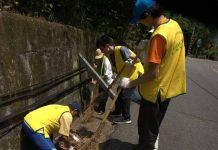I was reading over some old emails the other day and came across one from an acquaintance, asking about ecology-focused schools in our area. She wrote of how her 12-year-old granddaughter was struggling in the regular school system, but came alive and was more engaged when spending time with plants and animals.
The hopefulness and faith in the message from that grandmother was a poignant reminder to me of the importance of greening the hearts of our young people.
According to the Children & Nature Network (www.childrenandnature.org), “A growing body of research suggests that this disconnection, this nature-deficit disorder, may be associated with an epidemic of childhood obesity, childhood diabetes, behavior disorders, depression and a diminished sense of place and community.” Their list of potential impacts continues:
- heightened health problems
- higher stress
- higher aggression
- reduced cognitive and creative capacities
- lower school achievement
- blighted sense of efficacy
- diminished productivity
Greening the heart of childhood can turn that around. It means encouraging (indeed, inviting) young people to spend more time outdoors, in the arms of their other mother, Mother Nature. It means three-dimensionalizing the life of children. It means creating opportunities for kids to (re)kindle their innate bond with the natural world. Research collated by the Council of Outdoor Educators of Ontario (www.coeo.org/research-summary.html) shows that children need unstructured play time in Nature as much as they need adequate sleep and sound nutrition. It’s crucial for their cognitive development as well as their physical and emotional health and well-being.
Time spent exploring natural environments during childhood is important for another reason: it’s a gift to the rest of the world – and the future. Children who learn to know and love Nature as children grow up to be adults who respect and care for the Earth.
Environmentalists also explain that there was another important factor in their budding affinity for Nature. They had a special adult who shared this joy with them. Rachel Carson, author of Silent Spring, told us:
How can you be that important adult in a child’s life? In the United States, the National Wildlife Federation is promoting the Green Hour (www.greenhour.org), a time every day for children to play freely in the outdoors. Their website lists dozens of ways that parents can get their kids outdoors for fun and health and learning.
Educators also can be encouraged to take their students outside more often. According to Children and Nature 2009, A Report on the Movement to Reconnect Children to the Natural World, “As important as unstructured play in natural outdoor settings is – and it is dramatically missing from most of today’s children’s lives – so too are the opportunities for direct learning in the outdoors as a fundamental and foundational part of school curricula.”
Sometimes all it takes is one overarching permission form, signed by parents, to allow teachers to take their students outside to the local park or surrounding neighbourhood as often as they like. “Walkabouts” are weekly outings to the same natural area to watch seasonal changes over the course of the school year. Kids come to love these walks, developing their observational skills, empathy and sense of connection as the year passes. Every school subject can be enriched with visits to the outdoors, even in an urban setting.
A school garden, for example, teaches math skills and nutrition concepts, along with cooperation, team work and long-term planning. It becomes a site for Nature sketching and poetry writing, and provides quiet students with a contemplative place to sit during recess.
Raising happy, healthy kids starts with turning on to the beautiful world outside our windows … and then inviting the special children in our lives to join us out there.
Julie Johnston is a teacher with the Spring Leaves Family Learning program on Pender Island, Canada and a sustainability education consultant with GreenHeart Education (www.greenhearted.org).
 The Supreme Master Ching Hai
The Supreme Master Ching Hai


